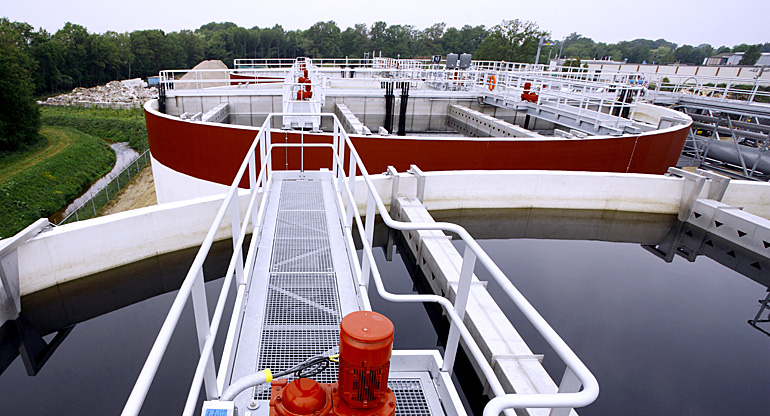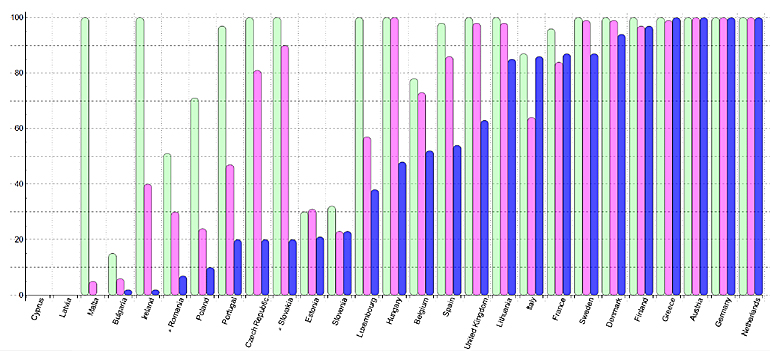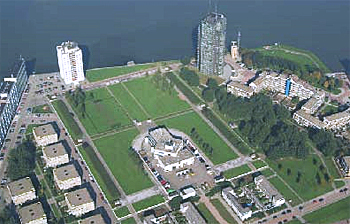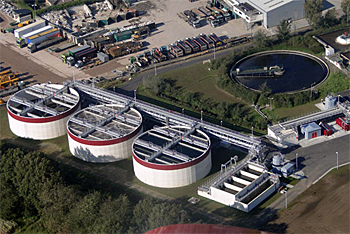Netherlands in top 3 of EU members that fully comply with treatment of urban waste water
 The Netherlands is, joined by Austria and Germany, one the three EU-members that fully comply with the EU Urban Waste Water Treatment Directive.
The Netherlands is, joined by Austria and Germany, one the three EU-members that fully comply with the EU Urban Waste Water Treatment Directive.
All three countries fully collect their urban waste water and treat it according to the minimum effluent standards.
In case of the Netherlands many waste water treatment plants (wwtp) meet more stringent effluent standards as they discharge their effluent on ecological sensitive surface water. These treatment plants have an additional third treatment step to remove phosphate and nitrogen.
The European Union recently published its 7th Implementation report on the Urban waste water treatment directive.
For the first time the report includes all 27 member states, covering almost 24,000 towns and cities of more than 2,000 inhabitants, generating pollution corresponding to a population of 615 million, so called population-equivalents.

The Netherlands complies with all three standards of the EU urban waste water directive: fully collection (green bar), fully secondary treatment (pink bar) and, where required, fully advanced treatment (blue bar).
Source: EU's 7th Implementstion report, August 2013.
New technologies to remove nutrients
The Dutch water authorities, water technology firms and research centers have worked closely together to develop new water treatment technologies to meet EU's strict standards on phosphate and nitrogen for wwtp plants.
As a result newly developed advanced technologies as Babe, Sharon, Anammox and Amfer are applied at several Dutch treatment plants for the removal of nitrogen from the sludge water. The dewatering of sludge results in a side stream that contains by far the highest nitrogen concentration at a wwtp plant.
The treatment of this side stream is a very effective way to reduce the nitrogen concentration on the effluent that is finally discharged.
Two new aerobic treatment technologies
 The full Anammox process is currently tested at the underground wwtp Dokhaven, Rotterdam.
The full Anammox process is currently tested at the underground wwtp Dokhaven, Rotterdam.
 Wwtp Epe was the first municipal waste water treatment plant with a full Nereda process, commissioned in May 2012.
Wwtp Epe was the first municipal waste water treatment plant with a full Nereda process, commissioned in May 2012.
In the Netherlands the stringent EU effluent standards led to the development of two advanced aerobic treatment technologies, based on new micro-organisms and activated sludge (granular).
The new micro-organism concerns the anammox bacteria that converts ammonium into nitrogen gas. The Anammox process was developed by Delft University of technology and is successfully brought to the market by the Dutch water technology firm Paques.
The first Anammox plant for the full treatment process is now tested at wwtp Dokhaven, Rotterdam.
The other new technology is the Nereda process, also developed by Delft University of Technology and brought to the market by Royal HaskoningDHV.
The first fully operational Nereda plant was commissioned at wwtp Epe in 2012. The second Dutch Nereda plant at wwtp Garmerwolde is about to be commissioned.
Large differences between member states
The recent EU implementation report on the collection and treatment of urban waste water shows an overall improvement, although there are large differences between Member States.
New Member States, which have started at a lower level, their collection and treatment generally also can improve, despite lower compliance rates. This progress has been made possible by 14.3 billion euros in EU aid in the period 2007-2013.
The report shows that 91% of the pollution load of the large cities in Europe is now treated more intensive, a significant improvement over the situation as described in the preceding report, when that share was 77%.
Investments pay off
Environment Commissioner Janez Potočnik said: "Waste water treatment is one of those fundamental tests for society: are we cleaning up the mess we create, or are we fouling the environment we depend upon? I am relieved to see the trends going in the right direction, and I am also happy to see that Commission action, a mix of financial support and tough legal action when necessary, has paid dividends for Europe's citizens."
The Seventh Report on the Implementation of the Urban Waste Water Treatment Directive (91/271/EEC) is published on the EU website [download pdf]
Read more on the Anammox and Nereda water treatment processes on this site:
- Cold Anammox starts nitrogen removal from low temperature waste water at wwtp Dokhaven (28 March 2013)
- Nereda's revolutionary aerobic granular biomass exceeds expectations at first full scale WWTP Epe (20 February 2013)
More information
European Commission
Directorate-General for the Environment
Brussels, Belgium
www.ec.europa.eu
Unie van Waterschappen (Association of Regional Water Authorities)
The Hague, the Netherlands
+31 70 351 97 51
www.uvw.nl



